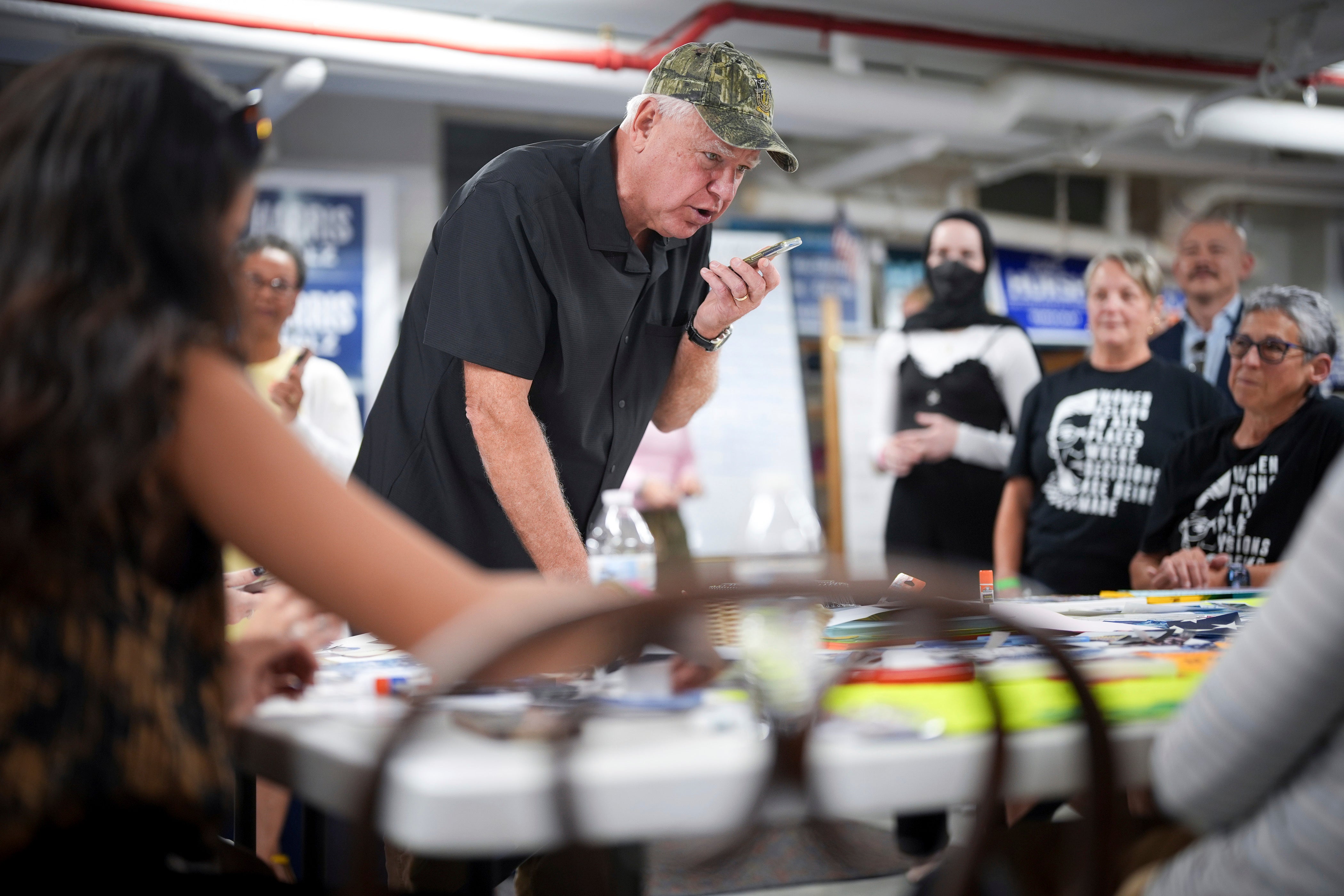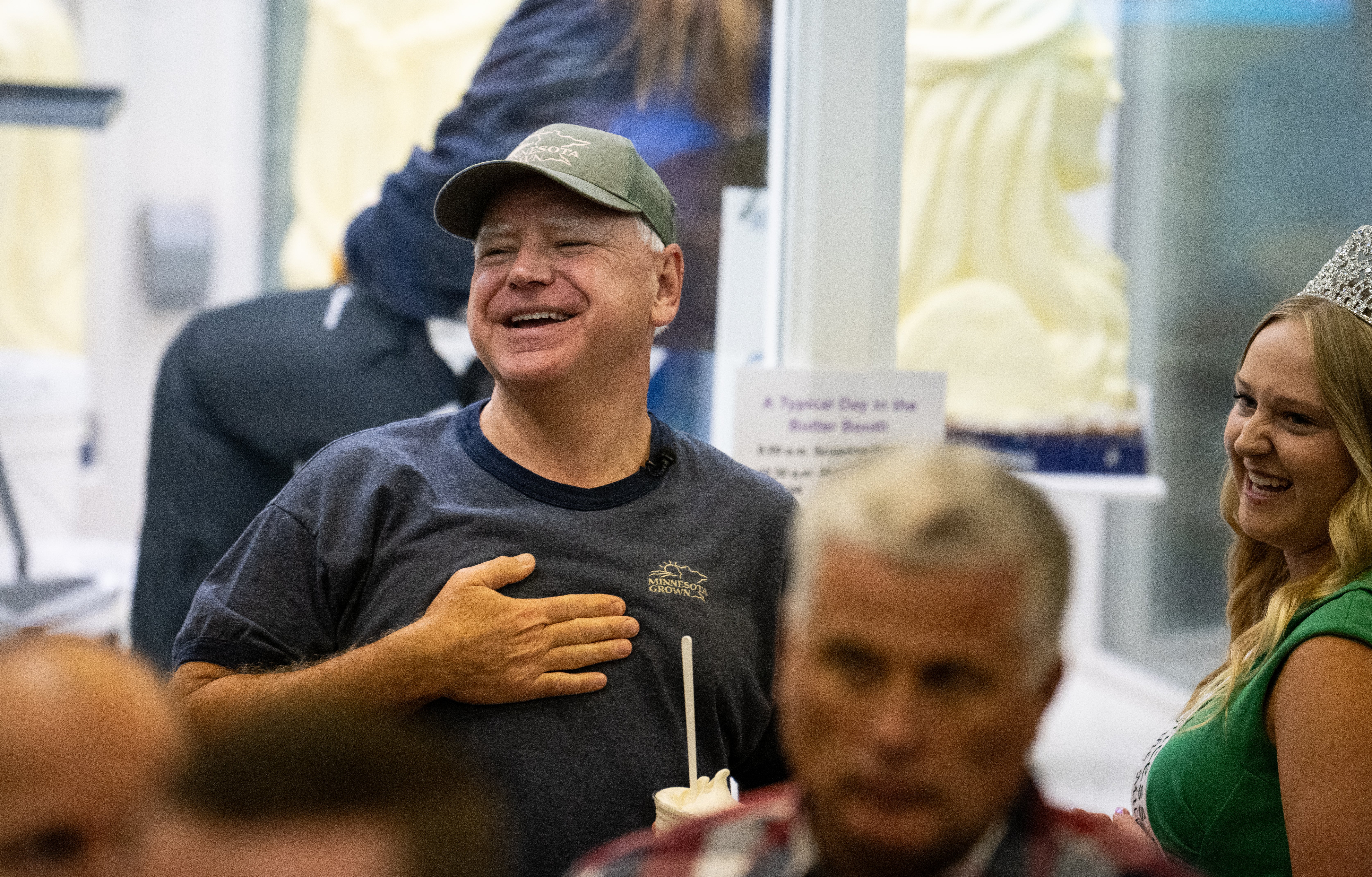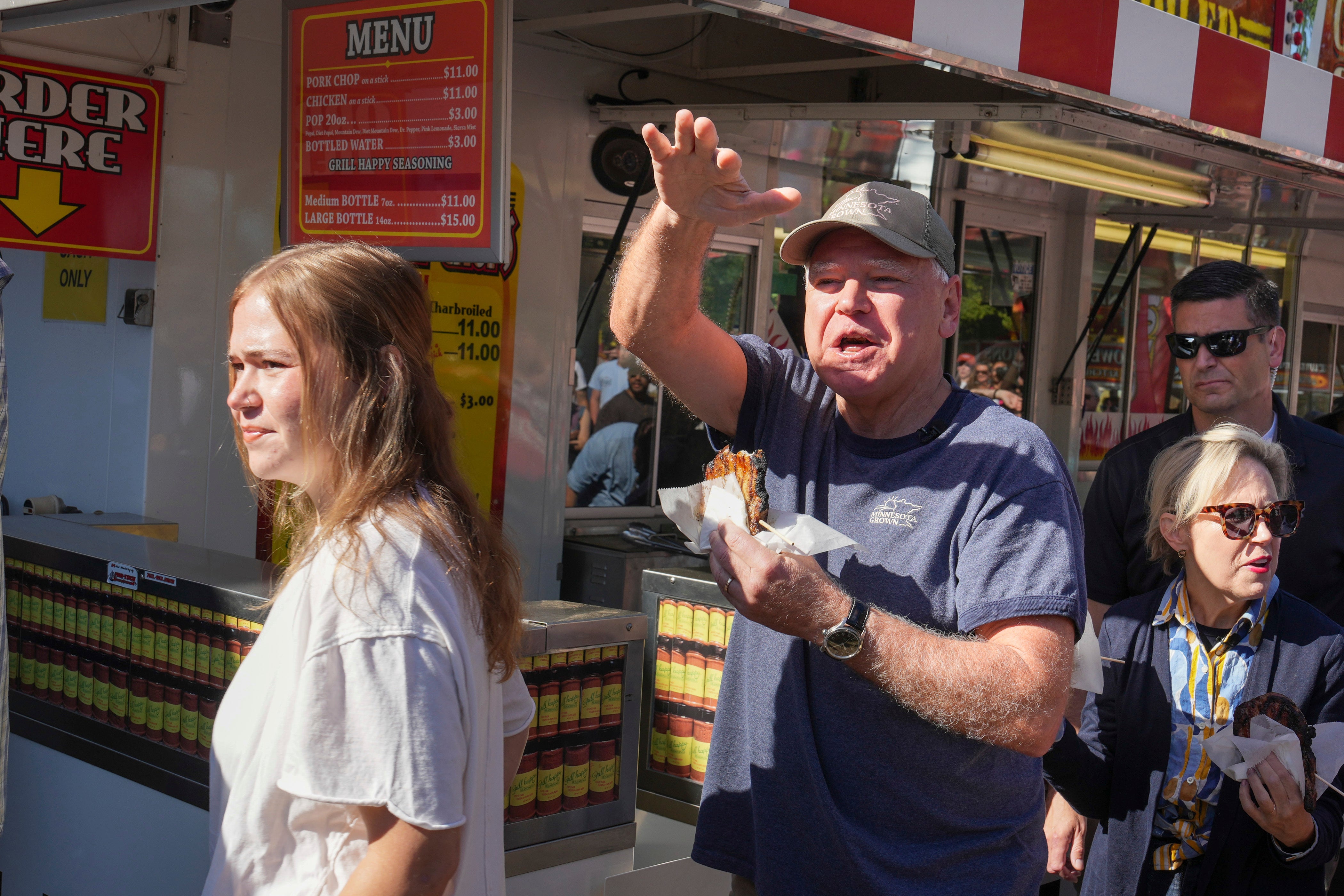In rural Pennsylvania, Tim Walz gets a good reception — from most people
Is Kamala Harris’s running mate doing enough to help Democrats win the crucial swing state? Richard Hall checks in on the Minnesota governor’s ‘barnstorming’ trip


Tim Walz was in full coach mode as he loomed over a hungry calf, a bottle of milk in hand.
“You got it, you got it! You’re close, sweetie. There you go,” he said, heaping encouragement onto the young cow at Maple Bottom Farm in Dawson, Pennsylvania.
The governor of Minnesota and vice presidential candidate had been dispatched on his first solo tour of the state — a “barnstorming,” in the words of his campaign — to win over voters in rural areas that have been stubbornly pro-Trump since 2016.
His pitch to rural Pennsylvanians, as told in every photo-op and stop and along the way, was simple: “I am just like you.”
There are few paths to victory for Kamala Harris and Walz without winning Pennsylvania, and few paths to winning Pennsylvania without earning at least some votes out here in the rolling farmlands that stretch across the state.
Joe Biden was able to narrowly win in this area by appealing to white working-class voters with the story of his difficult upbringing in Scranton.
Harris doesn’t have that story, but in Tim Walz she has a running mate who likely feels very familiar to those same voters.

Ask Walz supporters out here how he can win voters in rural Pennsylvania, and you’ll receive a variety of answers.
“He’s a strong union guy — that will count for a lot,” said Bill Waters, a former city controller of Lancaster and a union man for most of this life.
“He cares about the farmers in Minnesota. There’s a lot of farmers around here,” said Doug Wickenheiser, a Democrat outside Walz’s stop in Lancaster.
“I used to live in the northern part of the state and football’s big up there. Being a coach, a lot of guys can relate to that,” said Nancy Shot, a resident who stopped to wave to Walz as he arrived at an event.
“He understands guns, he owns them,” said Mary Lou, a campaign volunteer.
Walz himself was keen to emphasize the similarities between his hometown and the region he was campaigning in, telling volunteers: “There are so many things that Minnesota and Pennsylvania have in common.”
He stopped first at a farm shop with his daughter, Hope, just outside of the city of Lancaster, where the town thins out and gives way to fields of corn and the occasional Amish wagon. Wearing his infamous camo hat, and with his Secret Service protection dressed in plaid, he joked with the owner of Cherry Hill Orchards farm store about the origins of Pennsylvania’s whoopie pie.
“Look at me — I have no problem picking out donuts,” he said, pointing to his belly. On the surface, it was a self-deprecating joke; underneath, there may have been a sly reference to Trump’s running mate JD Vance and his own ill-fated campaign stop at a donut shop recently.
Walz went on to Maple Bottom Farm, just outside of Pittsburgh, to mix it up with the cows and talk with the owners about the challenges of agriculture.

Along the way, Walz stopped to meet “rural organizers” in the city of Lancaster who were phone-banking to drum up support.
Coming out of the room after Walz had left, Susan Robertson, secretary of a local Democratic committee, told The Independent: “We have more advertising going on our airwaves than I’ve ever seen in my life.”
“The city right here is very Democratic, but around us is really red. That’s where we’re trying to improve the margins here,” she added.
The way Robertson talks about Walz, he might have been created in a lab specifically for the task of winning rural voters here.
“He’s like a farmer — this is a farming area. He’s a relatable, union kind of guy — western Pennsylvania used to be a big union area. He’s a teacher. He’s just relatable in general,” she said.
The Harriz-Walz campaign has opened 50 field offices across the state, including 16 in predominantly rural counties like Lancaster. A campaign spokesperson told The Independent it was only the second Democratic presidential ticket to open a campaign office in Lancaster County, and the first ever to open an office in Ephrata, a rural borough of the county. These moves, the spokesperson said, demonstrate “a commitment to making inroads in rural and traditionally more conservative regions.”
Democrats in this region are also looking to find the 20 per cent of registered Republicans who voted for Nikki Haley in the April primary, with a view to convincing them to join them.
It’s true that Democrats have little chance of winning Lancaster County, which Donald Trump took handily 57 per cent to 41 per cent in 2020. But they don’t need to, either. They just need to improve their margins.
The hope is that Walz’s particular avuncular appeal might help them run up the numbers enough here to help them win the state.
In 2008, when Barack Obama won the state, he garnered 43 percent of the vote in the county. When Donald Trump flipped Pennsylvania in 2016, only 38 percent of the vote went to Hillary Clinton. Joe Biden carried Pennsylvania in 2020 when he won 41 percent of the vote in Lancaster.
The question remains: Is any of the Harris-Walz strategy working?
Walking out of the Cherry Hill Orchards just a couple of hours after Walz had visited, Richard Pope, a retired construction worker and a union man, is exactly the kind of person the Democrats are aiming to turn.
But his T-shirt — a doctored image of Joe Biden and Kamala Harris with the words “Dumb & Dumber” underneath — suggest they still have their work cut out.
“To be nice, I think he’s a piece of crap,” Pope said, of Walz. “He don’t help her one bit.”
“Down here we don’t like people who put tampons in boy’s bathrooms,” he added, in reference to a false claim spread on Fox News that Walz signed a law as Minnesota governor that ordered menstrual products to be placed in male bathrooms in public schools.
Pope said he believed a Harris-Walz ticket would be bad for the economy. He said he voted for Barack Obama once and then switched to Trump in 2016.
“They are trying to cut unions’ throats with the electric cars and stopping oil,” he added. He said that he doesn’t watch television news, but listens to Fox News on the radio.
Some voters out here, it seems, will remain out of reach — no matter how many times Walz steps foot on a farm.
Join our commenting forum
Join thought-provoking conversations, follow other Independent readers and see their replies
Comments
Bookmark popover
Removed from bookmarks